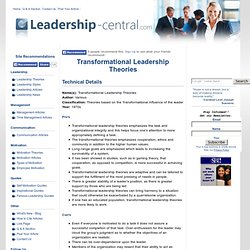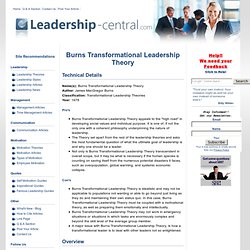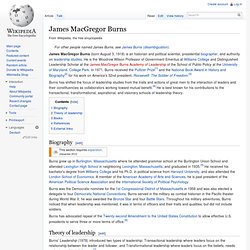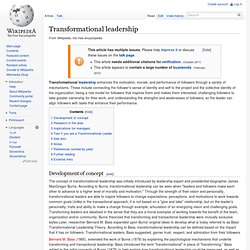

Do transformational leaders enhance their followers' daily work engagement? Bass_transforrmational_leadership.pdf (application/pdf Object)
Transformational Leadership Theories. Technical Details Name(s): Transformational Leadership Theories Author: Various Classification: Theories based on the Transformational influence of the leader Year: 1970s Pro's Transformational leadership theories emphasizes the task and organizational integrity and this helps focus one's attention to more appropriately defining a task.

The transformational theories emphasizes cooperation, ethics and community in addition to the higher human values. Long-range goals are emphasized which leads to increasing the survivability of a system. Con's Even if everyone is motivated to do a task it does not assure a successful completion of that task. Overview Transformational leadership theories beleive that people are motivated by the task that must be performed. It is odd to regard influential individuals such as Adolf Hitler and Attila the Hun as transformational leaders [1], but one must be aware that these categories of leadership theories overlap.
Discussion Critique. Burns Transformational Leadership Theory. Technical Details Name(s): Burns Transformational Leadership Theory Author: James MacGregor BurnsClassification: Transformational Leadership TheoriesYear: 1978 Pro's Burns Transformational Leadership Theory appeals to the "high road" in developing social values and individual purpose.

It is one of, if not the only one with a coherent philosophy underpinning the nature of leadership. The Theory set apart from the rest of the leadership theories and asks the most fundamental question of what the ultimate goal of leadership is and why one should be a leader. Con's Burns Transformational Leadership Theory is idealistic and may not be applicable to populations not wanting or able to go beyond just living as they do and maintaining their own status quo. Overview Burns Transformational leadership Theory, in other words, Burns focuses upon motivations and values in assessing how a leader approaches power. Discussion Burns' hierarchy of values has "public values" at the top. Critique.
James MacGregor Burns. James MacGregor Burns (born August 3, 1918) is an historian and political scientist, presidential biographer, and authority on leadership studies.

He is the Woodrow Wilson Professor of Government Emeritus at Williams College and Distinguished Leadership Scholar at the James MacGregor Burns Academy of Leadership of the School of Public Policy at the University of Maryland, College Park. In 1971, Burns received the Pulitzer Prize[1] and the National Book Award in History and Biography[2] for his work on America's 32nd president, Roosevelt: The Soldier of Freedom.[3] Burns has shifted the focus of leadership studies from the traits and actions of great men to the interaction of leaders and their constituencies as collaborators working toward mutual benefit.[4] He is best known for his contributions to the transactional, transformational, aspirational, and visionary schools of leadership theory. Biography[edit] Transformational Leadership - What Is Transformational Leadership. Have you ever been in a group where someone took control of the situation by conveying a clear vision of the group's goals, a marked passion for the work, and an ability to make the rest of the group feel recharged and energized?

This person just might be what is called a transformational leader. Transformational leadership is a type of leadership style that can inspire positive changes in those who follow. Transformational leaders are generally energetic, enthusiastic, and passionate. Not only are these leaders concerned and involved in the process; they are also focused on helping every member of the group succeed as well. Bass From Transactional toIransformational Leadership: Learning to Share the Vision.
Improving organizational ... - Bernard M. Bass, Bruce J. Avolio. Transformational leadership - Bernard M. Bass, Ronald E. Riggio. Transformational leadership. Transformational leadership enhances the motivation, morale, and performance of followers through a variety of mechanisms.

These include connecting the follower's sense of identity and self to the project and the collective identity of the organization; being a role model for followers that inspires them and makes them interested; challenging followers to take greater ownership for their work, and understanding the strengths and weaknesses of followers, so the leader can align followers with tasks that enhance their performance. Development of concept[edit] The concept of transformational leadership was initially introduced by leadership expert and presidential biographer James MacGregor Burns.
According to Burns, transformational leadership can be seen when "leaders and followers make each other to advance to a higher level of morality and motivation. " Bernard M.